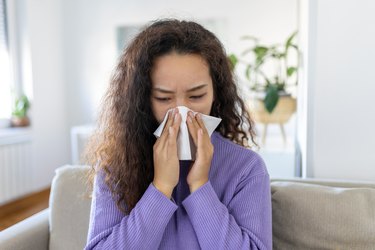
A "water up the nose" feeling seems like something that would only happen when you're in a swimming pool. That burning sensation can make it feel like your nose is drowning, which can be irritating and inconvenient, especially if it's for unexplained reasons.
But if your nose feels like you inhaled water, there are three main causes most likely to blame.
Video of the Day
Video of the Day
Here, Zara Patel, MD, a professor of otolaryngology and Director of Endoscopic Skull Base Surgery at Stanford Medicine, explains the most common causes and ways to treat them.
1. Allergies
Allergies can strike at any time and, according to the Asthma and Allergy Foundation of America (AAFA), it's one of the most common chronic diseases. Also known as allergic rhinitis, this is when your nose becomes irritated by allergens and inflamed.
If you're getting a constant runny nose, coughing, sneezing and swollen or itchy eyes, it's most likely allergies. In severe cases, allergies can also cause life-threatening symptoms including throat closing and trouble breathing, per the AAFA.
"Anything that causes inflammation in the nose or sinus cavities can make you have these symptoms," Dr. Patel says. She explains that irritation, congestion and drainage in your nose are common signs of allergies causing that "water up your nose" feeling.
Fix It
For allergic rhinitis, Dr. Patel first suggests getting allergy tested to identify specific allergens that may be causing irritation. You can then undergo allergy desensitization, also known as allergen immunotherapy, to build tolerance towards the identified allergens.
To help manage your symptoms, try dry nose remedies like saline spray or rinses.
2. Non-Allergic Inflammation (Rhinitis)
Non-allergic rhinitis can occur from irritation by other things in the air, like pollution, Dr. Patel explains. It could also be the result of dysregulation of your autonomic nervous system within your nose — what's called vasomotor rhinitis.
"That dysregulation can occur for many different reasons — medications and underlying disease states — but the most common reason is simply getting older," Dr. Patel says.
If you're regularly waking up with a stuffy nose (and you don't have a cold) or have a post-nasal drip, it could be nonallergic rhinitis, per the Mayo Clinic. It can affect children and adults, but it's most common in people older than 20.
Fix It
For inflammation in the nose (rhinitis), nasal rinses combined with prescribed nasal sprays are the best treatment, Dr. Patel says. "There are different types of nasal sprays, and a doctor could prescribe the correct combination after obtaining a history and performing an exam," she says.
3. Sinus Infection
A sinus infection, also called sinusitis, can make your sinuses feel like you inhaled water. According to the Cleveland Clinic, sinus infections can be viral, bacterial or fungal. The amount of time the infection lasts can vary.
"There is acute sinusitis, lasting less than a month typically, and chronic sinusitis, which is when sinus inflammation lasts for three months or longer," Dr. Patel says. "People often think that sinusitis means they have a sinus 'infection,' but an infection — whether viral or bacterial — is only one of many reasons why you might end up with inflammation."
The main symptoms of sinusitis include:
- Post-nasal drip
- Runny or stuffy nose
- Facial pressure
- Tooth pain
- Ear pressure
- Fever
- Bad breath
- Cough
- Headache
- Fatigue
There are also genetic and environmental factors that can contribute to chronic sinusitis, like nasal polyps, Dr. Patel says. Sinusitis can occur with or without polyps, but polyps are a sign of more severe inflammation.
Fix It
Treatment for sinusitis can depend on the underlying cause. A specialist doctor (an ENT or otolaryngologist) can help you identify the cause with a nasal endoscopy and typically a CT scan to evaluate the sinuses if it’s gone on longer than a month.
Other Treatments for Nasal Inflammation
If nasal rinses or sprays are unsuccessful in getting rid of the "water up your nose" feeling, Dr. Patel says further treatments may be necessary.
"Adding medical therapy such as antibiotics or steroids may be needed to resolve the issue," she says. "Sometimes these medical therapies would be in oral form (like a pill) and sometimes this would be medicine we could add to a rinse."
If those solutions don't work either, surgery may be the next step. Surgery can address underlying genetic factors, clear the infection or inflammation and allow for rinses and sprays to gain better access to the sinuses.
"It is important, however, to remember that surgery does not change the underlying reactivity to the environment," Dr. Patel warns. "Continuing topical medical therapy after surgery is just as important to keep patients at the good new baseline we can get them to."
When to See a Doctor
If your symptoms are interfering with your quality of life or ability to do everyday activities, it's probably a good time to see your doctor. If symptoms persist or worsen, you should also seek medical attention.
"Any time a sinus infection starts to cause more severe headache, pain, lethargy, change in vision or change in eye position would be when you need to be seen more urgently," Dr. Patel says.
Is this an emergency? If you are experiencing serious medical symptoms, please see the National Library of Medicine’s list of signs you need emergency medical attention or call 911.


